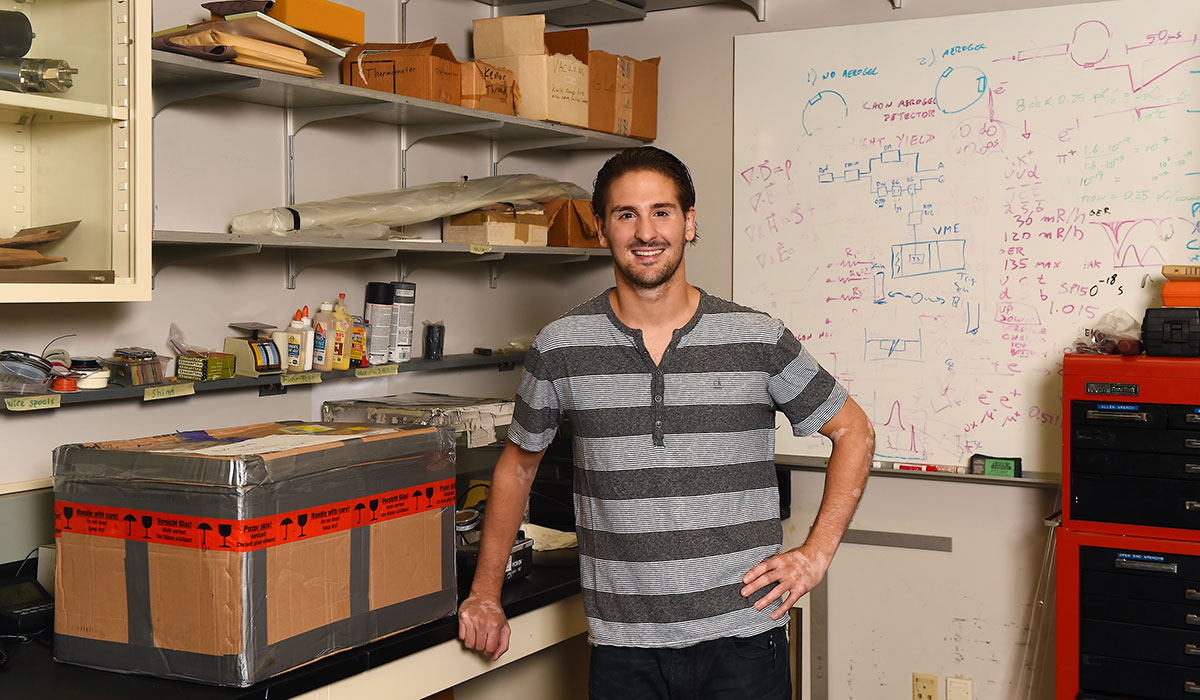

Doctoral candidate Richard Trotta has been awarded the Jefferson Sciences Associates (JSA) award for the 2019-2020 academic year. This award will support Trotta’s advanced studies in physics at Catholic University and research at the Thomas Jefferson National Accelerator Facility (Jefferson Lab), a U.S. Department of Energy nuclear physics laboratory managed and operated by JSA.
“It feels great to be awarded! I ran around my apartment when I found out I received the JSA Fellowship,” said Trotta.
Trotta is one of nine graduate students receiving the JSA fellowship. Recipients are chosen based on their research proposals, academics, and references from their professors and scientists at Jefferson Lab.
“This fellowship will provide me easier access to experts and resources in my field as well as funds for research related travel,” says Trotta.
Tanja Horn, professor of physics and Ph.D. adviser, helped identify this fellowship opportunity for Trotta and was able to guide him in the process of applying. “Dr. Horn gave me great advice on structuring the proposal as well as articulating my thesis into terms that would sound more appealing to the fellowship selection committee,” says Trotta. “It is quite a task writing the proposal and her guidance really made the experience a lot less stressful.”
Over the years Horn has had much success with helping students like Trotta win competitive fellowships. Marco Carmignotto, Ph.D. 2017, won the JSA fellowship in 2014 and 2015, and doctoral student Salina Ali received a National Science Foundation stipend in 2018 to conduct research at the Institute of Nuclear Physics of Orsay in France. In 2018, Trotta also won the Electron-Ion Collider Center fellowship.
Trotta’s research proposal is on his thesis experiment, which studies the origin and structure of atomic nuclei in terms of its basic building blocks — quarks and gluons. He specifically focuses on a particle called kaon to better understand quarks and the proton’s internal structure.
Trotta explains, “protons and neutrons are made of three tiny particles called quarks. These quarks are very difficult to study because they are under the influence of the strong force. This strong force is a fundamental force like gravity. The further you try to take a quark out of a proton the harder it will get and the more energy you will need.
“Eventually, you will pull with so much energy another particle (quark) will be created from this energy. You now have pulled out two quarks when you only wanted one. You can only study the quarks in a proton by studying them two at a time. These two-quark systems are called mesons and the kaon is one particular type.”
His proposal also includes research in particle detection instrumentation, and the materials used to build them. This is part of joint projects between Horn’s nuclear physics research and the University’s Vitreous State Laboratory, which provides opportunities for students to participate in cutting-edge research and high-tech applications in society.
“This prestigious fellowship will allow Richard to continue his growth towards becoming a future science leader and researcher by providing the environment and financial resources for him to work alongside Jefferson Lab researchers as he continues his academic studies and pursue research opportunities in this specialized field of science,” says Horn.
Trotta has a few more years before he finishes his Ph.D., but he hopes to get a postdoctoral position at a university doing similar research, and eventually become a professor.